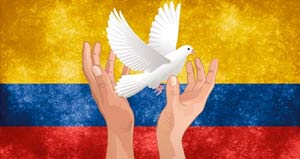 After almost three years, the Colombian peace process currently underway has made important advances on the issue of reparations for victims and the search for the truth, two topics vital to the post-conflict phase.
After almost three years, the Colombian peace process currently underway has made important advances on the issue of reparations for victims and the search for the truth, two topics vital to the post-conflict phase.
According to ¡Basta ya! (Enough Already!) Colombia: Memories of War and Dignity, of the National Center for Historical Memory. (CNMH), the over 50 year war, one of the longest in the region, has resulted in the displacement of six million people, 220,000 dead, and almost 30,000 kidnapped.
The Center has begun compiling statistics from the period between 1958 and 2012, starting in 1958, the year in which clashes between liberals and conservatives – also known as “La Violencia” (The Violence) – began.
Meanwhile, 25,000 people were estimated to have been disappeared since the outset of the conflict; however, the current figure is believed to be 45,000, reported Paula Gaviria, director of the Unit for Care and Integral Reparation of Victims, on October 19.
Experts have also noted that the tragedy of the disappeared continues to impact and persist throughout the nation, particularly in Antioquia, Cesar, Meta and Ca quetá.
This is why the recent agreement reached between the Colombian government and Revolutionary Armed Forces of Colombia-People’s Army (FARC-EP), in the context of the ongoing peace process, is giving hope to families of the victims demanding their right to learn the whereabouts of their loved ones.
The accord proposes the creation of a special body to deal with such cases, and collaboration with the International Red Cross (IRC), the Institute of Legal Medicine and Forensic Sciences in addition to other specialist Colombian organizations.
The document signed in Havana, where the talks have been taking place since November 2012, also notes that the government of Juan Manuel Santos will speed up the process of identifying those who have died during police operations and buried as John Does (unidentified).
For its part, the FARC-EP has pledged to hand over details about the location of victims’ remains.
The agreement on locating the whereabouts of victims could suggest that the process is coming to an end; which is why news of the accord was met with such broad reactions from diverse sectors of Colombian society.
Head of the IRC in Colombia, Christoph Harnisch, stated that the institution is ready “to help implement these decisions;” adding that the Committee will provide key assistance in exhuming remains in areas to which the state does not have access, advice to institutions responsible for undertaking the issue, and other missions.
Voices calling for peace in Colombia are also making themselves heard, such as that of Senator Iván Cepeda, who described the accord as “transcendental.” In an interview with Latin American multinational broadcaster Telesur, the Alternative Democratic Pole Senator, went further saying, “It constitutes a new component in the system of truth, justice and reparations.”
According to Cepeda, the agreement will provide thousands of Colombians with an efficient mechanism to search for their loved ones in cemeteries, common graves, and could also give them the opportunity to obtain information, locate, exhume and identify their missing relations.
The accord is giving people back their rights in what is considered to be one of the country’s most terrible atrocities, along with forced disappearances.
For now, the wounds of this conflict are beginning to be healed, while the principal participants in the peace talks themselves have publicly promised to initiate a process of healing to bring peace to the nation.
(Granma)